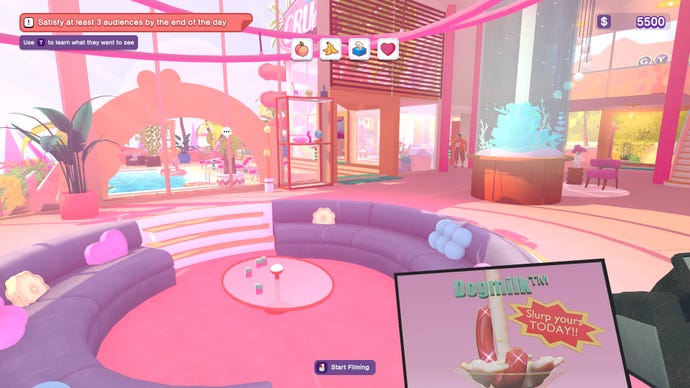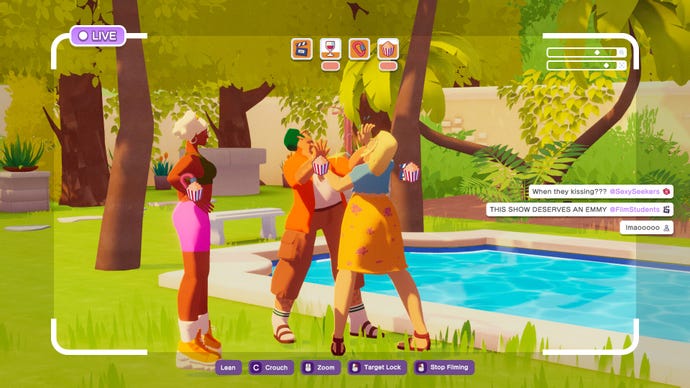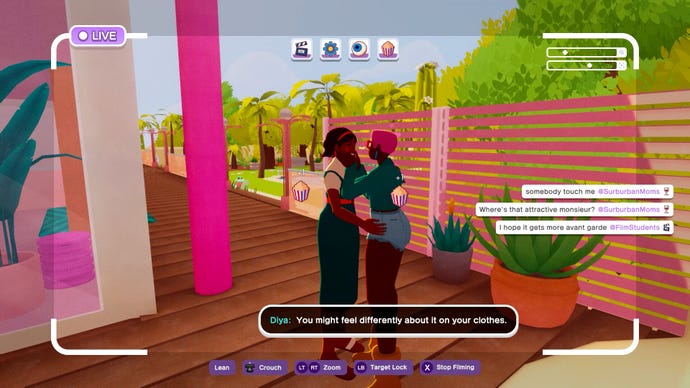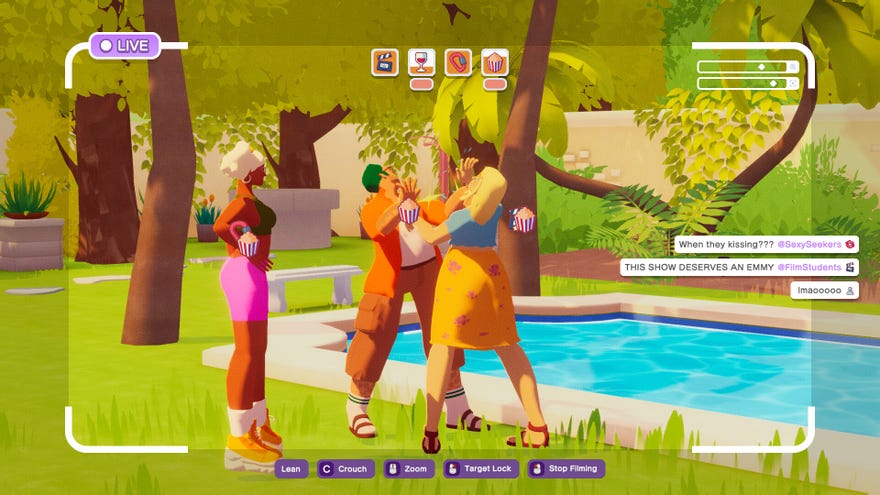The Crush House is a saucy 90s reality TV show simulator from the developers of Reigns
Big Bother
I'm not much of a reality TV watcher. Genuinely, I've been humiliated on this count in RPS morning meetings, with certain "colleagues" whose names rhyme with "Malice Knell" making references I don't understand and laughing at my expression of hurt and confusion. My grasp of reality TV basically ends with the finale of the very first season of Big Brother, feat. Nasty Nick. But you could argue that you don't need to watch reality TV to understand and enjoy reality TV, because the basic reality TV thrill of forming weird parasocial attachments to people who are role-playing as themselves is now the golden rule of digital society generally.
"'Reality' stuff is huge now, and it's not just reality TV," says Nicole He, designer of The Crush House - an enticing, absurdist and engrossingly unpleasant new sim from Reigns and Card Shark developers Nerial. "It's any kind of celebrity or influencer or streamer or something like that - there are so many parasocial relationships in that way, and I think that really started with reality TV, and then [continued] in the era of social media. It's one of those topics that we don't talk about in an explicit way, necessarily, but it's something that you hopefully think about as you're playing the game."
In The Crush House, you are Jae - an underpaid network employee who is single-handedly producing "1999's hottest reality TV show", with a different cast of four each week. The game falls into a day-night cycle. By day, you roam a syrupy Oddworld interpretation of a Malibu mansion in first-person, filming the preening "residents" as they mingle and flirt and fight and variously make a spectacle of themselves. There's one red line: never speak to the talent. While filming, you'll also have to strike a balance between the desires of different audience demographics, as designated by emojis in the comments feed down the right hand side.
The "popcorn" faction are the easiest to please: they just want to see people forming relationships, though they're also mystifyingly keen on scenes of people drinking the show's official beverage Crush Juice. The "flower" group are landscape lovers who are thirstier for posh shrubbery than people. "They're kind of like a HGTV audience who likes gardens and things like that," says He. "Not only do they want to see plants, but they also sometimes want to see specific plants, like a blooming prickly pear, so I have to figure out what that is."
Film students, meanwhile, prioritise form over content: they yearn for avant garde camera angles and artfully unfocussed backdrops. "Schadenfreuders" are after displays of cringe - at its most basic, this could be a close-up shot of a toilet bowl, but "cringe" is a term that harbours multitudes. And "sexy seekers", of course, are partial to footage of butts and people making out. While you're chasing the characters around the mansion and balancing the preferences of these different groups, you'll also have to make space for ad breaks in order to monetise those views. In one of publisher Devolver's trademark shows of self-referentiality, some of the ads were contributed by the creators of other Devolver games. There's one for Bennet Foddy's upcoming Baby Steps, a wiggling golden bottom-supplement commercial of sorts, which I am finding impossible to unsee.

That's your day-to-day. By night, you'll pore over your earnings in the wilting office/bedroom below the mansion, and possibly buy props and decorations that might foam up a little chemistry or suit the tastes of one or other viewing demographic - disco floors, statues of people fighting, and saucy lawn ornaments. You can also venture upstairs to enjoy the darkness and silence of the mansion without any pressure to Create Content - and during these reprieves, you might stumble into a member of the cast.
Again, you're not allowed to talk to the talent, but does that apply after hours? The talent don't think so. They may have feedback and suggestions, perhaps with a view to building their own brands. Bare-chested lothario Emile might request that you capture him snogging somebody with only his face in view. Wholesome prude Charlie might ask you to avoid filming below waist level. Self-professed man of culture Gunther might demand that you procure some special cooking equipment, so that he can propose to another housemate after serving them an exquisite meal. Taking on these favours doesn't earn you anything directly, but it might lead to some spicy interactions and perhaps, show you a side of each character that isn't apparent when they know they're being filmed. "They're not actors," says He. "They're not completely different [at night], necessarily, but there's another side to them, other motivations for them being here." Curious and curiouser.
There are 12 Crush House characters in total, and you can cram any combination of four into the house each weekly season, though there isn't fully scripted dialogue for every last possible character interaction - after all, there are hundreds of possible permutations. Instead, the game relies on a "semi-procedural narrative system", as He explains, which "looks at each of the cast members in the House, their personality traits, what they're attracted or not attracted to, and sort of creates these scenes that happen between them."
I'm fascinated by the idea that you might catch Crush House cast members falling into or out of role - or at least, moving between different roles, because there's no guarantee the housemates aren't putting on appearances even when you chat to them off-camera after dark. "The way that we play with that currently, in the animation, which is still in progress, is when they look at the camera [and when they don't]," He comments. "It's a subtle thing but it's also meaningful, because in their day to day stuff, most of the time, they don't look at the camera, but then there are some specific moments - they will look at the camera or you as the character and kind of break that fourth wall."

Perhaps needless to say, there's a mystery at the heart of the Crush House. It boils down to a couple of questions. Firstly: where do the cast go, exactly, when they triumphantly exit the mansion via the "Success Slide" at the end of the week - assuming you manage to keep the show funded that long? And secondly: what's in the basement below your office? If you play your cards right, or wrong, you might receive an invitation over your walkie-talkie to step into the elevator and find out.
He says that The Crush House takes cues from all across the history of reality TV as a concept, blending understandings of the genre at its most innocent and most cynical. "We were inspired by lots of different shows, including older ones from [the Big Brother era] and also newer ones in terms of format and stuff," she explains. "I think something that is really interesting in contemporary reality TV is that when reality TV first came out, the appeal was like, 'oh, we get to see regular people doing stuff in this way. And it's interesting to have a glimpse into other people's lives or whatever'.
"And now, everyone's like 'this is all fake, right?'" she continues. "We all know that it's scripted, that the producers are manipulating things, but I'm going to watch it anyway, and watching it is more about not taking it at face value, trying to figure out the meta story, I guess. What is this person's real motivation for being here?"
The Crush House also picks and choose eras of reality TV in terms of how it portrays things like abuse, bigotry and harassment. "That was an interesting question that we had to think about from the very beginning," He says. "And also just in how we designed the characters, how we read the dialogue, because we have 90s references and stuff in the dialogue, but we didn't want it to feel really 90s, because there's so much misogyny and so much homophobia at the time.
"I think we use humour to try to walk that line, because with audience groups like the butt guys, right, it's a little on the edge," she goes on. "But I think that with the overall narrative, and treating the cast members like three dimensional characters, we're not just trying to be edgy for the sake of being edgy, or trying to reflect all those toxic things just to get a rise out of people, but just take it as part of the culture and the experience and make it sort of fun."

The character I have the greatest parasocial attachment for in The Crush House at the time of writing is Jae, the unsleeping, free-roaming voyeur who must wear the hats of an entire TV production crew. The exertion of trying to keep tabs on all housemates at once, the brutalising requirement that you pay no regard to their personal space, the neck and back problems that will surely result from having to angle the camera bizarrely so as to cram in as many hashtag-worthy moments as possible... It seems like a thankless, degrading line of work. In terms of mechanics and systems, there's clearly fun to be had racing to appease all those different eyeballs while peeling back an underlying conspiracy. But The Crush House is also profoundly ugly in ways not lightyears away from Santa Ragione's otherwise dissimilar Horses. It's a digital grotesque in which you strenously tee up and record scenes of cadaverous melodrama for a shifting audience of sickos.
It wasn't always quite this frenzied, inasmuch as there was once a clear division between shooting footage and editing it into a show - it's almost as though Nerial laid off members of the in-game TV crew during development. "The first approach was a lot more like you're filming something, and then later you edit an episode, and set up a nice shot, etcetera," says He. "But we found it to be both more fun from a gameplay perspective to be driven to do a bunch of different things, and have little challenges, basically. And also, I think thematically it's nice, because again you are a worker doing a job, and you're driven by your boss's profit essentially, and trying to do things that are kind of absurd, to be honest, because the audience is demanding this."
"Obviously the tone of the game is quite silly and funny in some ways, the absurdity of the requests is part of the fun of that," she concludes. "But I think you had a really nice way of putting it - the ugliness of things, the hecticness is part of the vibe that we wanted to have as well."










